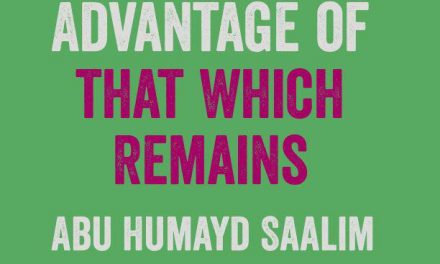[soundcloud url=”https://api.soundcloud.com/playlists/593868555″ params=”color=#ff5500&auto_play=false&hide_related=false&show_comments=true&show_user=true&show_reposts=false&show_teaser=true” width=”100%” height=”450″ iframe=”true” /]
Notes
Lesson 1
What is Hadeeth?
The definition of a Hadeeth:
“Statements, actions, and tacit approvals of the Prophet ﷺ and his physical attributes and mannerisms”
This definition is the same definition used for the term “Seerah”, likewise “Sunnah” amongst the Muhadditheen (Scholars of Hadeeth).
Types of Hadeeth
There are numerous types of Hadeeth which include:
1. Hadeeth Qudsi
When the Prophet ﷺ narrates from Allaah ﷻ. The wording and meaning are both from Allaah ﷻ.
The difference between a Hadeeth Qudsi and the Qur’aan is:
- There is a specific reward for the one who recites the Qur’aan but not the Hadeeth Qudsi.
- All of the Qur’aan is Mutawaatir (a Hadeeth which has been narrated from so many different routes that is impossible that all the narrators came together upon a lie – it is the strongest type of Hadeeth). As for a Hadeeth Qudsi, then some are mutawaatir, others are not.
- The Qur’aan is to be recited with Tajwid, unlike the Hadeeth qudsi.
- Hadeeth Qudsi cannot be recited in the Salah.
2. Hadeeth Marfoo’
A Hadeeth which has been attributed to the Prophet ﷺ. It can be attributed to him in 2 ways:
- Directly – I.e. “I heard the Prophet ﷺ say”/ “I saw the Prophet ﷺ do”, etc.
- Indirectly – It is not mentioned that he ﷺ said or did it, however, it is something that only the Prophet ﷺ could have known. i.e. A companion narrates something from the affairs of the unseen.
3. Hadeeth Mawqoof
The statement or action of a companion of the Prophet ﷺ.
4. Hadeeth Maqtoo’
The narration of a Taabi’i (student of the companions) or the one lower than him.
Authenticity of Hadeeth
As it relates to authenticity, Hadeeth is of 3 types: Sahih, Hasan, Dha’eef. (While some scholars include the Mawdoo’ narration as the fourth.)
Hadeeth Saheeh (Authentic)
This is the strongest category of authenticity. It has 5 conditions that must be fulfilled. 3 of them must be present while the remaining 2 must not be present.
- Connected Chain
- Narrators must have Adaalah (integrity)
- Narrators in the chain must have Dhabt (precision)
- No Shudhoodh (Contradicting narrations which are stronger than it)
- No Ilal (Hidden defects)
Hadeeth Hasan (Good)
This is a level below the Sahih Hadeeth in terms of authenticity, however it is still Maqbool (acceptable).
A hasan Hadeeth must fulfil all 5 conditions specified for the Saheeh Hadeeth with the exception of the 3rd condition. The narrators within a Hasan Hadeeth are of a level of precision lower (albeit still precise) than the Saheeh Hadeeth.
There 2 types of Hasan Hadeeth: 1) Hasan Li Dhaatihi 2) Hasan Li Ghayrihi
Hasan Li Dhaatihi
This is a Hadeeth which is at the level of Hasan in and of itself, fulfilling the conditions discussed above.
Hasan Li Ghayrihi
This is a Hadeeth which in and of itself is a Dha’eef (weak) narration. However, its weakness is only slight and there are other narrations which can support it and push it up to the level of Hasan.
Hadeeth Dha’eef (Weak)
This is the lowest level of authenticity and cannot be used as a proof. It can be defined in 2 ways:
- Any Hadeeth which does not fulfil any of the conditions required for a Saheeh or Hasan Hadeeth.
- Any Hadeeth in which the precision of the narrators falls below the level required for a Hadeeth to be considered Hasan.
Hadeeth Mawdoo’ (Fabricated)
This is of course considered a weak narration. The ruling on fabricating a Hadeeth is that it is haram. This is due to the statement of the Prophet ﷺ:
“Whomsoever lies upon me intentionally, then let him take his seat in the Hellfire.” (Bukhari)
About the Book
The Sunan of Abi Dawood is from the 6 books of Hadeeth. They are as follows (listed in order of virtue):
- Sahih Al Bukhari
- Sahih Muslim
- Sunan Abi Dawood
- Sunan At Tirmidhi
- Sunan An Nasaa’i
- Sunan Ibn Maajah
It is known as a book of “Sunan” due to it being laid out in order of Ahkaam (Rulings). It is not correct to call it “Sahih Abi Dawood” as the intent of the author was not to gather the authentic narrations, rather the intent was to gather narrations which are used as proofs in matters of Fiqh.
The first book within the Sunan is “Kitaab At Tahaarah” (The Book of Purification). The books of Fiqh often start with purification due to it being the condition of the prayer with the greatest number of issues.
Lesson 2
Chapter 1 – Explanation of The Sunnah
“Sunnah” linguistically means a way, a path or guidance.
As for its meaning in the Shari’ah (legislation), then it can have 2 meanings:
- Amongst the Scholars of Hadeeth:
“Statements, actions, and tacit approvals of the Prophet ﷺ and his physical attributes and mannerisms”
- Amongst the Scholars of Fiqh:
“Mustahab” (Recommended Acts – The one who does it is rewarded while the one who leaves it off is not punished)
The meaning of Sunnah in the context of this chapter is that which is connected to Usool ad Din (Fundamentals of the religion). Also known as, Aqeedah (Creed) or Tawheed (Monotheism) or Al Fiqh al Akbar (The Major Fiqh).
Imaam Ash Shaatibi defined Sunnah as:
“That which is transmitted from the Prophet ﷺ that is not found in the Qur’aan.”
Hadeeth No.4596
“It was narrated that Abu Hurairah said: “The Messenger of Allaah ﷺ said:
“The Jews will split into 71 or 72 sects, and the Christians will split into 71 or 72 sects, and my Ummah will split into 73 sects.”” (This Hadeeth is Hasan)
Hadeeth No.4597
It was narrated from Abu ‘Amir Al Hawzani that Mu’awiyah bin Abi Sufyan stood up among us and said: “The Messenger of Allaah ﷺ stood up among us and said: “Those who came before you of the people of the Book split into 72 sects, and this Ummah will split into 73 sects, 72 of which will be in the Fire and one in Paradise. That is the Jamaa’ah.
Ibn Yahya and ‘Amr added in their Hadeeth:
“And there will emerge among my Ummah people who will be dominated by those whims and desires as rabies dominates its victim.”
‘Amr said: “Rabies does not leave any vein or joint of its victim but it enters it.” (This Hadeeth is Hasan)
Benefits Related to the Two Hadeeth
- The Prophet ﷺ informed us of the splitting of the Jews and the Christians as a warning to us.
- The prohibition of being like the People of the Book.
- In the Hadeeth is a sign from the signs of the Prophethood of the Prophet ﷺ. As he foretold of the splitting, and surely we see that this splitting has occurred.
- The fact that this splitting has been mentioned is not an evidence for splitting being praiseworthy; rather it is blameworthy.
- There are 2 types of people as it relates to this Hadeeth:
- The Destroyed (anyone from the 72 sects)
- The Saved One (anyone from the Jamaa’ah)
- The Jamaa’ah is what is in accordance to the truth even if you are alone in that. The proof that the Jamaa’ah can be just one person is the statement of Allaah ﷻ in the Qur’aan in which he describes Prophet Ibrahim Alayhis Salaam as a whole nation by himself:
“Verily, Ibrahim (Abraham) was an Ummah (a leader having all the grood righteous qualities), or a nation, obedient to Allaah, Hanifa (i.e. to worship none but Allaah).” (Surat An Nahl: Verse 120)
Lesson 3
Chapter 2 – The Prohibition Against Arguing and Following the Mutashaabih of the Qur’aan
Mutashaabih (verses whose meaning is not absolutely clear and decisive) can have 2 meanings:
- That which only Allaah ﷻ knows the meaning or explanation of.
- Its miraculous and eloquent nature. According to this meaning, the whole of the Qur’aan is Mutashaabih.
Hadeeth No.4598
“It was narrated that Aa’ishah said: “The Messenger of Allaah ﷺ recited this Verse: ‘It is He Who has sent down to you the Book. In it are verses that are entirely clear (Muhkamaat), they are the foundations of the Book; (And none receive admonition) except men of understanding.’”
She said: “The Messenger of Allaah ﷺ said: ‘If you see those who follow the Verses which are not entirely clear, those are the ones whom Allaah has mentioned so beware of them.’” (This Hadeeth is Saheeh).
Benefits related to the Hadeeth
- The Ayaat of the Qur’aan fall into 2 categories:
- Muhkam (Clear and decisive) – The muhkam verses are of 2 types:
1) That which even the general muslims will know the meaning of.
2) That which the Scholars of this Ummah will know the meaning of.
- Mutashaabih (Not entirely clear and decisive) – that which only Allaah ﷻ knows.
- An example of the Salaf dealing with those who followed the Mutashaabih Ayaat is the story of Imaam Maalik Rahimahullaah being asked about the Istiwaa’ (Ascension) of Allaah ﷻ. His response was:
“The Istiwaa (Ascension) is known. Its Kayf (Howness) is unknown. To believe in it is obligatory and to ask about it is Bid’ah. And I do not see you except to be misguided.” (Recorded by Imaam Al Bayhaqi)
- The Sifaat (Attributes) of Allaah ﷻ are not mutashaabih in terms of their meaning in the language (we know what Ascension, Hearing, Seeing, etc. mean) but the kayfiyyah (Howness) of these attributes is mutashaabih.
- If it becomes apparent to you that someone is a stubborn opposer of the truth, then at this point they are to be abandoned and not argued with. An example of this is the statement of Imaam Maalik in which he said to a man from the people of innovation who came to argue with him:
“As for me, then I am up Bayyinah (Clarity) in my religion. As for you, you are confused, so go to someone confused like yourself.”
Lesson 4
Chapter – Staying Away From The People Of Desires And Hating Them
Hadeeth 4599
“It was narrated that Abu Dharr said: “The Messenger of Allaah ﷺ said: ‘The most virtuous of deeds are loving for the sake of Allaah and hating for the sake of Allaah.’” (This Hadeeth is Dha’eef)
Benefits from this Hadeeth
- Although the Hadeeth is weak, its meaning is correct. We know the meaning is correct from other texts from the Book of Allaah ﷻ and the Sunnah of Allaah’s Messenger ﷺ, for example:
“You (O Muhammad ) will not find any people who believe in Allah and the Last Day, making friendship with those who oppose Allah and His Messenger (Muhammad ), even though they were their fathers, or their sons, or their brothers, or their kindred (people). For such He has written Faith in their hearts, and strengthened them with Ruh (proofs, light and true guidance) from Himself. And We will admit them to Gardens (Paradise) under which rivers flow, to dwell therein (forever). Allah is pleased with them, and they with Him. They are the Party of Allah. Verily, it is the Party of Allah that will be the successful.”
(Suratul Mujadilah: Verse 22)
- Loving and Hating for the sake of Allaah are from the foundations of the Deen.
- Shaykh Al Albaani declared this Hadith to be Hasan.
Hadeeth 4600
It was narrated that Ibn Shihaab Az Zuhri said: Abdurrahman ibn Abdullah ibn Ka’b ibn Maalik informed me that Abdullah ibn Ka’b ibn Maalik – who was the one among his sons who served as Ka’b’s guide when he became blind – said: “I heard Ka’b ibn Maalik – and Ibn As-Sarh (one of the narrators) mentioned the story of his staying behind from the Prophet ﷺ during the campaign to Tabuk – say: ‘The Messenger of Allaah ﷺ forbade the Muslims to speak to us three, then when that had gone on for a long time, I climbed the wall of the garden of Abu Qataadah, who was my paternal cousin, and greeted him with Salaam, and by Allaah he did not return my greeting’” Then he quoted the story of the Revelation of the acceptance of his repentance. (This Hadeeth is Saheeh).
Benefits from this Hadeeth
- We see an example of a Musalsal The chain shares the characteristics of sons narrating from their fathers.
- The main point of benefit of this Hadeeth is that the Prophet ﷺ forbade the muslims from speaking to them. This is a proof that the one who is upon bid’ah must know (by way of the boycotting of the people of sunnah) that what he is upon is falsehood.
- The boycotting of the sinful person can be greater than 3 days despite the Hadeeth in which the Prophet ﷺ said:
“It is not permissible for a muslim to boycott his brother for longer than 3 nights.”
Imaam Al Baghawi clarifies how we can combine between the Hadeeth and the fact that the Prophet ﷺ boycotted Ka’b ibn Maalik RadhiAllaahu Anhu for 40 days or more, in his book Sharhus Sunnah:
“The prohibition of boycotting for more than 3 nights is not related to the affairs of the religion. Because the boycotting of the people of innovation is continuous up until they repent from it.”
- The permissibility of entering the house of your companion without their permission if you know that they are happy for you to do so. This is mentioned by Ibnul Qayyim Rahimahullaah.
- The act of a companion can be considered as a proof if it does not oppose the statement or actions of the Prophet ﷺ or another companion (in the case of opposition to another companion, the affair must be returned back to the Book of Allaah and the Sunnah of the Messenger ﷺ). This is the most correct opinion according to Shaykh Ibn Uthaymeen Rahimahullaah.
- The boycotting of an individual can be done for the wellbeing and benefit of the one boycotting. This is in contradiction to the false claim made by some that you can only boycott if it is for the benefit of the one being boycotted.
Lesson 5
Chapter 4 – Not Greeting The People of Desires With Salaam
Hadeeth 4601
“Upon the authority of Yahya ibn Ya’mar, upon the authority of Ammaar Ibn Yaasir who said: “I came to my family and my hands had developed cracks (in the skin) so they dyed my hands with saffron. The next morning I came to the Prophet ﷺ and greeted him with Salaam, and he did not return my greeting. He said: ‘Go and wash this off’. (This Hadeeth is Dha’eef)
Benefits from this Hadeeth
- This Hadeeth is Dha’eef due to a breakage in the chain between Yahya ibn Ya’mar and Ammaar Ibn Yaasir. However, Shaykh Al Albaani Rahimahullaah declared the Hadeeth to be Hasan.
- This Chapter is Takhsees (Specification) after Ta’meem (Generalisation). The previous chapter was general in having hatred for the people of desires whereas this chapter is specific about not giving them the Salaam.
- The reason the Prophet ﷺ did not return the salaam of Ammaar was due to the wearing of Saffron being an imitation of the women. This shows the impermissibility of imitation of women, alongside other clear Ahadeeth such as the Hadeeth of ibn Abbaas:
“The Prophet ﷺ cursed the Mukhanitheen (men who imitate women) and Mutarajulaat (women who imitate men).”
- The Chapter and Hadeeth do not indicate that Ammaar Ibn Yaasir is from the People of Desires. Rather, the usage of the Hadeeth for this chapter is to show that if the Prophet ﷺ refused to return the greeting to a noble companion due to the saffron on his hands being an imitation of the women, then the innovator has more right to be refused the salaam.
Lesson 6
Chapter 5 – The Prohibition Against Arguing About The Qur’aan
Hadeeth 4603
“It was narrated from Abu Hurairah that the Prophet ﷺ said: “Opinion based arguing about the Qur’aan is Kufr (Disbelief).” (This Hadeeth is Hasan)
Benefits from this Hadeeth
- At the start of the chain Imaam Abu Dawood mentions “Ahmed Ibn Hanbal narrated to us…”. This shows to us that Imaam Abu Dawood was from the students of Imaam Ahmed ibn Hanbal.
- It is a must to have complete Eemaan (Belief) in the Qur’aan.
- The intent behind Kufr in this Hadeeth is not disbelief that will take you out of the fold of Islaam. Rather the intent is that opinion-based arguing about the Qur’aan can lead you to Kufr. Perhaps one will become arrogant and stubborn whilst arguing to the extent that they reject a verse from the Qur’aan. This is no doubt Kufr.








